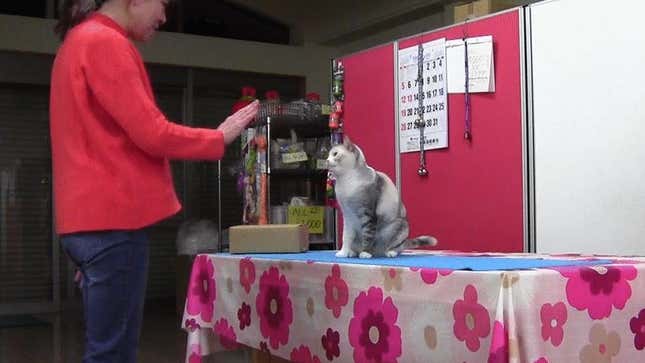
Feline intelligence may be more impressive than we’ve appreciated, at least according to a new study. The research claims to present the first evidence that cats can recognize and then mimic human behavior on command—a feat that only a few other animals, including dogs, are known to do.
The paper, published earlier this month in the journal Animal Cognition, described the case of an 11-year-old cat named Ebisu, living with her owner Fumi Higaki in Ichinomiya, Japan. According to Science Magazine, animal behavior researcher and study author Claudia Fugazza had met and worked with Higaki—a professional dog trainer—during her research studying cognition in canines.
At some point, Higaki mentioned to Fugazza that she had trained Ebisu to imitate her, using a method long applied to dogs: the Do as I Do paradigm. This involves the trainer yelling out a command (“Do as I Do!” for example), carrying out a behavior, and then indicating with another action (saying “Do it” for example) that the animal should mimic the behavior to get a potential reward. Ebisu, according to Higaki, had long been “exceptionally motivated for food,” which made her ripe for training. It only took from May to September of 2019 for Ebisu to become well-versed at copycatting, Higaki told the researchers.
Last winter, in December 2019, Fugazza conducted experiments with Higaki and Ebisu at their pet shop. Because Ebisu was wary of strangers, the tests were carried out by Higaki herself, with Fugazza watching and recording video from the other side of the room.
All told, through 18 trials, Ebisu seemingly proved capable of imitating Higaki’s behaviors 81% of the time. These behaviors included spinning around, touching the same toy, opening a small drawer, and laying down horizontally. What made the mimicry even more interesting was that Ebisu seemed capable of seeing her owner’s not very cat-like motions and figuring out how she would do the same thing as a cat, such as when Higaki raised her arms up high and Ebisu then stood up on her hind legs and lifted both her paws up.

“Based on the cat’s performance, we argue that she has the ability to map the different body parts and movements of the human demonstrator into her own body parts and movements, at least to some extent,” the study authors wrote.
Simple as that might seem, this kind of cross-species mimicry has only been observed in a few animals, such as killer whales, apes, dolphins, and dogs, and it’s thought to take a particularly complex sense of cognition to accomplish. Animal intelligence doesn’t need to be—and often shouldn’t be—measured against human intelligence. After all, having certain cognitive abilities isn’t a sign of being highly evolved; it’s just one potential outcome of natural selection. But it would still be a remarkable thing to know that cats can interpret people’s behavior well enough to copy it.
Interesting as this research is, though, it’s important to bring up some caveats, namely that it’s a sample size of one. In this case, it’s possible that Ebisu’s training only made her appear capable of imitation (the act of seeing a behavior, then intentionally trying to copy it), rather than cats being innately able to recognize another species’ movements and imitating them if properly motivated. It’s also possible that Ebisu somehow read her owner’s nonverbal cues in order to figure out how to behave—a well-established problem in animal behavioral research known as the Clever Hans effect. Clever Hans is the early 20th-century horse that was thought to be good at math but was actually reacting to his owner’s cues on where to move his hooves for the “answer.”
However, according to Fugazza, the very nature of “Do as I Do” training should prevent cueing from happening, since it breaks down the test into two distinct commands. She also had Higaki avoid eye contact with the cat while issuing her commands during the tests.
“In studies where the ‘two action’ method is used, cueing is controlled for, because two different actions are demonstrated on the same object,” she said in an email. “In this case, even if the demonstrator would give a visual cue to send the animal in the direction of the given object, the cue would still not tell the animal what action to do on it (these are untrained actions, so they cannot be commanded by a cue, because there is no cue that has previously been associated to them).”
Fugazza still collaborates with Higaki in her capacity as a dog trainer. But sadly, this was the first and last time that Ebisu’s amazing aping could be studied, since the cat developed kidney disease in early 2019 and died soon after the tests were completed. Though cats are known for not being the most cooperative lab partners, Fugazza does believe that other felines could be successfully trained as Ebisu was, thereby allowing other researchers to replicate and study in depth their potential ability to play a copycat. Ideally, these studies will be able to look at a variety of cats across a spectrum of different characteristics, such as age and familiarity with people.
“Of course it is possible to conduct future studies on cats. I hope that somebody will take up the challenge to do it, but I am also aware of the difficulties and time needed to train cats,” Fugazza said. “So, I feel it’s a matter of time and resources.”
When reached for comment on this study and its startling implications, Gizmodo cat Cheddar “Chiz” Cara declined to participate.
